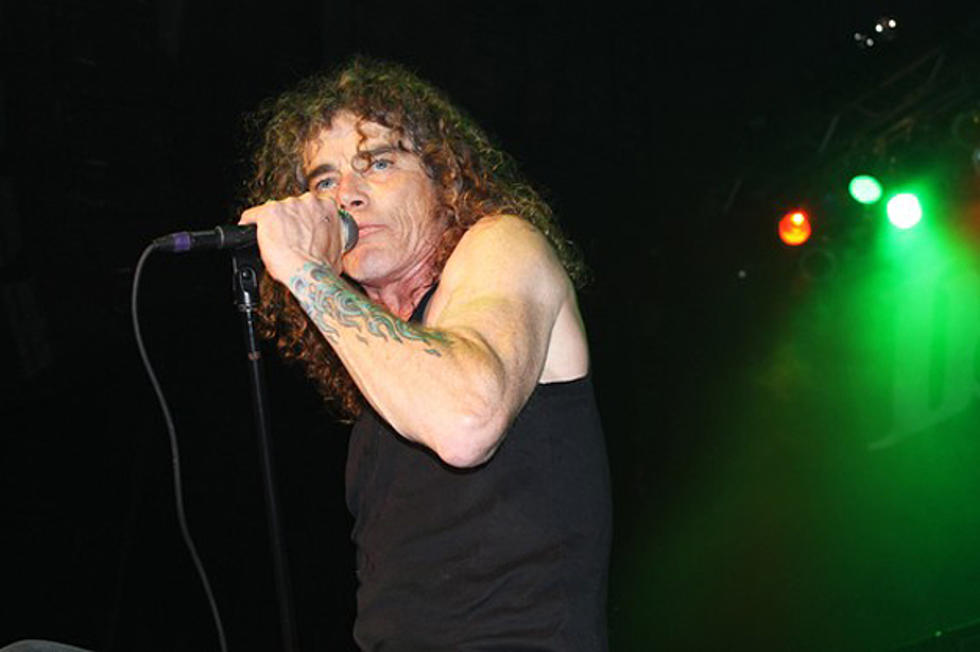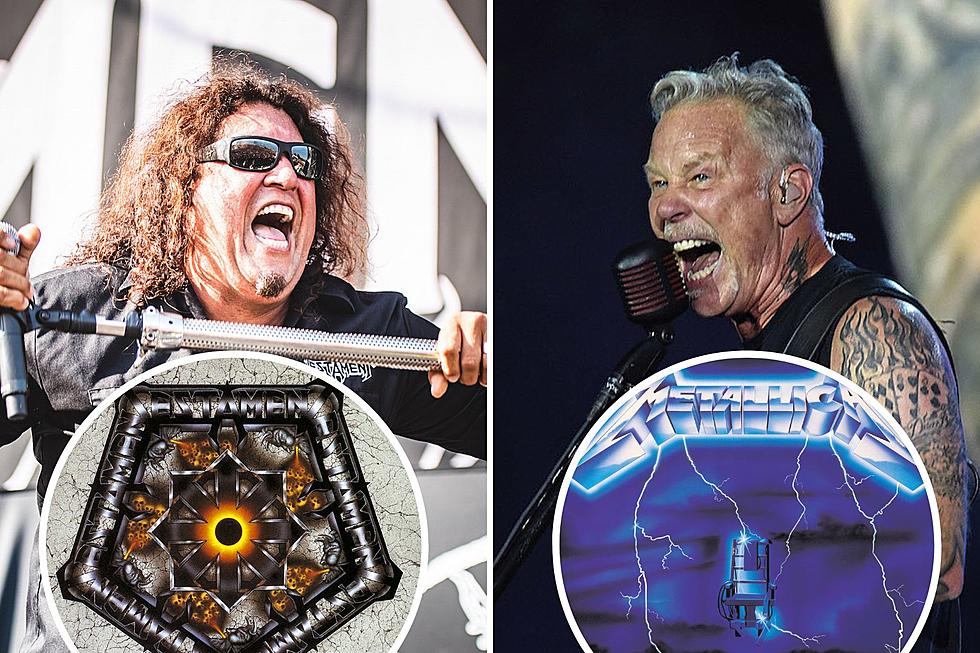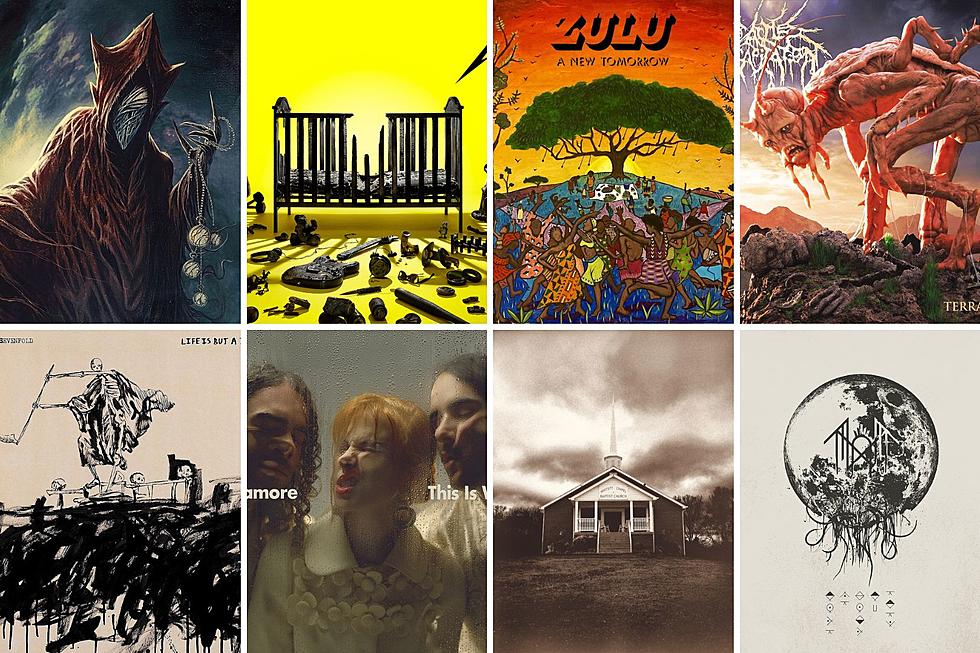
Overkill Singer Bobby Blitz Talks New Album ‘The Electric Age,’ Band’s Longevity + More
Overkill frontman Bobby Blitz was the guest on Full Metal Jackie’s radio show this past weekend. The New Jersian and veteran singer talked all about the his thoughts on the band’s new album ‘The Electric Age,’ their headlining tour of the U.S., keeping the music fresh and relevant after 30 years and 16 albums, and much more. If you missed Jackie’s show, check out her interview Bobby Blitz of Overkill below:
We’re obviously here to talk about your brand new record ‘The Electric Age.’ It’s out in stores now. Congratulations a great record and obviously been well received.
So far so good, I mean we’re on the road, we’re supporting this record. We work on that clock, I’ve known D.D. Verni for 30 years, we’ve been releasing since 1985, we been touring since ’86, we’ve been working on that clock continuously. So since ’85 now, 16 records and 16 world tours and things can’t be better. It cracks me up when people say “What about the good old days” and I say “Man, you’re livin’ them, it’s now.” [Laughs]
Bobby, you’re a blur on stage, a blitz so to speak, it’s hard to imagine not jumping around in the studio, too. What are you like in the vocal booth when you’re recording such an aggressive album like ‘The Electric Age’?
I mean that’s a great question and I’ve learned to be able to work around highly sensitive mics in the studio but there was times in the past where I had to have the same mic I had onstage. They would duct tape it to the mic stand, I would be holding the mic stand and they would give me a full room to record in, things have changed a little bit since then. I think that now it’s more about controlled chaos than just chaos for the sake of chaos but that’s a good point, I have in the past used microphones that I can actually pick up and run around with and let’s say blur.
No one ever says a new Overkill album sucks because they’re always good; is quality control always top of mind?
I think that’s a good point but I don’t think that it’s deeply that thought of. I think it’s really about competing with yourself. If I can compete with what I did on the last record and try to beat that, therefore compete with myself then I have a good chance of success, a good chance for a relevant vocal performance. I think D.D. competes with riffs he had on the last record, same across the board. We’re really talking about – let’s say being known for what we are as opposed to being known for what we were and that’s why I’m probably proudest of what we’ve done all these years. To be able to say “Hey Overkill records don’t suck” based on that competition with ourselves. I mean pay attention to your own house, do what you have to do, go in there and tear it up and I really think that’s what helps us be relevant in the current day.
Are there a lot of studio takes and unused songs that just don’t make the cut?
No. [Laughs] I know that that’s the norm with many of the other bands but for us we learned early on to focus on what we’re doing and we pick the ten best riffs, those riffs develop into songs – very much like building a house, if that’s the foundation by the time that building of the house finishes, I’m putting the roof on it. It’s ten riffs, those ten riffs develop, they’re all agreed upon and they all go through a process of expansion, development.
In this case with ‘The Electric Age,’ it was the longest period of time in between starting recording, demoing those ten riffs to delivering it, it was probably about eight months. What we did was we’d record a little bit, save some drum tracks that went down, then we’d hit the road for a few shows, then some bass tracks would go down, we’d hit the road for two weeks, guitars, we’d do a South American tour. So I think what we brought to the table this time that is a little bit different for those ten riffs is that we could instill what was live into the studio without trying to fake it. It was record, play live, record, play live all through that eight month process. So I think it worked but the record’s got a power packed feel to it, energy and life.
For the kids about to listen to Overkill for the first time, what makes ‘The Electric Age’ the best place to start rather than ‘Horrorscope’ or ‘The Years of Decay’?
I think contemporary relevance; we just talked about makes me proud about doing this. I think that this record has value for 2012, I think it’s attraction is now. It’s attraction is not like “Oh this was and it’s been rehashed” this has got a new energy, this has got great band chemistry, the scene is healthy, it reflects the day. I think one of the things we’ve exploited is the chemistry of the band, the last two, three records, we’ve been able to take that positive feeling of being on the road and doing those shows into the studio. So I think this is a great place to start and of course go back and hear the catalog, there’s development all along the way but if you want to be blown away today hear ‘The Electric Age’.
Bobby, you never expected Overkill to last longer than a couple of albums, just a few years. Here it is 16 albums and over 30 years later, what would be lacking most in Bobby Blitz’s life without this band?
Oh my God, I couldn’t even think about it. I thought it was going to be college and on to something else, I mean even used cars, who knows what “Hey I can put you in a 1990 Lexus today!”
Done. I’ll buy it! Just kidding.
[Laughs] But I think how it worked in hindsight was D.D. and I started managing the band in the early, mid '90s and I think we’re very different people. D.D.’s more longsighted, I’m a little more short sighted and I think that works with regard to partnership because I’m living for it now, I’m living for the day and D.D.’s planning a little bit ahead – you put them both together and your get longevity, you get good planning but you also get explosive moments along the way. I think that’s why it’s worked but if it wasn’t here, I don’t know anything else – so we’re not even talking about a career anymore, we’re really talking about a lifetime. It’s quite interesting that it’s lasted for two plus decades.
I kind of feel like I’ve been around for a lot of it, growing up on the East Coast and seeing Overkill play at the Birch Hill and all my local stomping grounds over there, so it’s really cool to be talking to you about a new record this many years later. I’m proud of you Bobby Blitz.
[Laughs] Well for those of you that don’t know the Birch Hill was one of the old places, so Jackie was banging her head at I think nine or ten years old.
I may or may not have had a fake I.D. going to Birch Hill when I was 13 years old, it may or may not have been true.
That’s my favorite thing when somebody goes “How old are you guys now for Godsake?” and I say “Well D.D. and I started the band when we were nine.” [Laughs]
Next week, Full Metal Jackie will have Fear Factory frontman Burton C. Bell on her show. Full Metal Jackie can be heard on radio stations around the country — for a full list of stations, go to fullmetaljackieradio.com.
More From Loudwire









